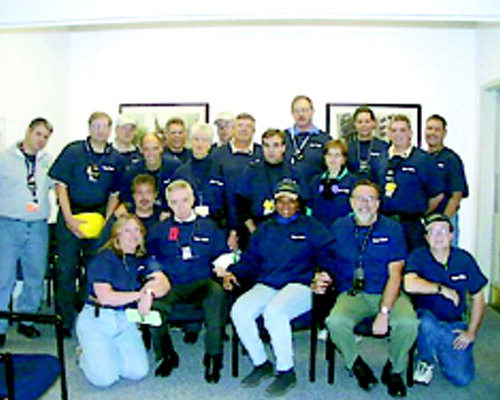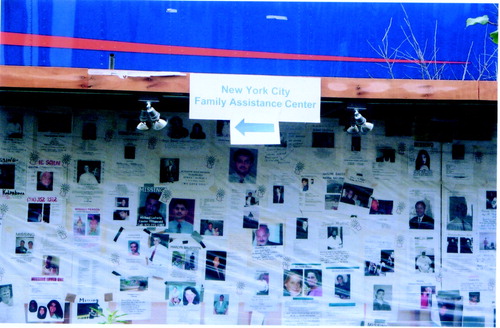Throughout New York Area, Psychiatrists Respond
Rosalie Landy, executive director of APA’s New York County District Branch in Manhattan, started getting calls from psychiatrists offering to help within 24 hours of the World Trade Center attacks last month.
“The number of calls has been overwhelming. Psychiatrists in New York, New Jersey, Connecticut, Massachusetts, Florida, Colorado, and even Argentina have offered to come here to assist us,” Landy told Psychiatric News.
She is not turning anyone away because the need for psychiatrists is expected to increase in the coming weeks and even months. Untold millions witnessed the terrorist attacks in person or on television and were directly or indirectly affected by the deaths of approximately 5,400 people at the World Trade Center. In addition, many more people are experiencing a range of symptoms—from anxiety to insomnia—because of these tragic events and fear that more attacks could occur at any time.
Although psychiatrists are still needed to go to family-assistance and crisis-counseling centers in Manhattan, Landy said she is starting to get calls from people seeking individual counseling by psychiatrists.
She is keeping a list of New York County DB members who have offered to provide free initial counseling sessions and can refer people commuting to Manhattan from Connecticut and New Jersey to district branches in their home area (see story on Original article: page 8).
Landy said that APA’s Erich Lindemann disaster support grant her DB received last month will be used to educate state and federal legislators about the psychological trauma resulting from the attacks, update the DB’s disaster Web page, conduct workshops to educate members about treating disaster victims, and cover related administrative costs.
The Web page, under the heading “Disaster Outreach,” features a bulletin board, which includes a peer-support group. Messages cover a gamut of topics from requests for volunteers to information on mental health services for victims and their families and rescue workers. There are also links to trauma-related Web sites and downloadable documents that include information for clinicians and patients.
The workshops will be organized by the cochairs of the DB’s disaster committee, Craig Katz, M.D., and Francine Cournos, M.D. Cournos directs the Mental Health Training Project at Columbia University, which presented a free mental health disaster training session last month with the Center for Trauma Studies at Columbia.
Katz is president of Disaster Psychiatry Outreach (DPO), which has been recruiting, training, and sending psychiatrists to sites run by the Salvation Army and American Red Cross.
Lois Kroplick, D.O., president of the West Hudson Psychiatric Society (WHPS), took the DPO training before she volunteered at the Pier 94 Family Assistance Center, which was set up to help the families of the victims of the World Trade Center attacks. Kroplick lives in Rockland County, about a 40-minute drive north of Manhattan.
Kroplick said she learned about the disorders that victims are likely to develop, medications appropriate to dispense on site, and crisis interventions.
“Katz emphasized that our purpose was to meet people’s basic needs while helping them regain some equilibrium,” Kroplick told Psychiatric News.
 She described the Pier 94 Family Assistance Center as consisting of miles of booths with representatives from numerous organizations, including the New York State Office of Mental Health, American Red Cross, Salvation Army, police and firefighter unions, and companies with missing employees. There were also insurance company representatives on hand to help people file for benefits, said Kroplick.
She described the Pier 94 Family Assistance Center as consisting of miles of booths with representatives from numerous organizations, including the New York State Office of Mental Health, American Red Cross, Salvation Army, police and firefighter unions, and companies with missing employees. There were also insurance company representatives on hand to help people file for benefits, said Kroplick.
During the third week of September, when she worked her first shift, Kroplick talked to tour guides employed by the World Trade Center who just missed the plane crash and lost colleagues. “They were jobless and having trouble eating and sleeping. I encouraged them to maintain as much of a normal routine as possible and showed them where to apply for financial help,” said Kroplick.
She also helped families of security guards who perished at the World Trade Center obtain free counseling near their homes and apply for financial aid.
Kroplick helped a woman who was unable to live in her building because of its proximity to the World Trade Center. “She had symptoms of acute stress disorder from watching the planes crash into the building, people jumping to their death, and the buildings collapse. Because she said she hadn’t slept in days, I gave her some sleeping pills. The Red Cross gave her unlimited funds to live in a hotel until she can move back,” said Kroplick.
She observed that the mood of family members had changed when she returned for her second shift at the Pier 94 center at the end of September. “Last week they still hoped their relatives might still be alive; this week the reality set in, and there were anger and depression.”
She continued, “I was able to help a family obtain funds for a memorial service for their uncle. That was a success story.”
She and another WHPS member, Bharati Palkhiwala, M.D., also presented a training session for psychiatrists in their area about disaster psychiatry and were recruiting more volunteers to work with DPO and at the Pier 94 center, said Kroplick.
Other WPHS members, including Palkhiwala, volunteered to go to Manhattan and help people affected by the attacks. She went to the New York University Law School near the World Trade Center, where students had witnessed the unfolding tragedy and were concerned about their safety.
In addition, several members of the WHPS and the Psychiatric Society of Westchester County offered to provide three or four free counseling sessions to people affected by the disaster.
Other New York DBs Respond
The following are among the actions taken by other New York district branches in the wake of the terrorist attacks:
• The New York State Psychiatric Association signed up more than 100 volunteers at the request of the state Office of Mental Health to assist victims and family members across the metropolitan area and state.
• The Queens District Branch secured half-hour public television slots for panel discussions consisting of trauma experts.
• The Greater Long Island Psychiatric Society sponsored a talk at a community day care center on depression, posttraumatic stress disorder, and grief. The DB also worked with the American Red Cross to provide counseling to the families of airline victims and a local agency to provide counseling services to widows and children of deceased firefighters.
 DB Secretary/Treasurer Frank Dowling, M.D., has been counseling police officers and emergency workers at a stress-management center near the World Trade Center.
DB Secretary/Treasurer Frank Dowling, M.D., has been counseling police officers and emergency workers at a stress-management center near the World Trade Center.
Dowling, who is a medical advisor to the Police Organization Providing Peer Assistance (POPPA), estimated that 1,500 to 2,000 police officers rushed to the scene to assist or rescue people after the planes crashed into the north and south towers and were inside or near the buildings when they collapsed. A number of them are now presumed dead, Dowling told Psychiatric News.
The vast majority of the 40,000 officers in the New York Police Department (NYPD) have been working at ground zero since the attacks. They have been securing the area, digging for survivors, searching for remains, and working at the morgue and the landfill where removed material is sent, said Dowling.
“While we are especially concerned about the initial responders, we are aware that nearly all of the NYPD has been exposed to the trauma in real, vivid, graphic, and painful ways and can benefit from assistance coping with the effects,” said Dowling.
Many police officers have come to group debriefings led by peer-support officers trained in crisis intervention, with clinicians present in case police officers develop serious emotional problems, said Dowling.
“Our goal is to help them cope with the common stress symptoms that result from such exposure and prevent PTSD, depression, alcohol abuse, relationship and marital problems, and, of course, suicide,” said Dowling.
More psychiatrists are needed on POPPA panels, said Dowling. Those interested are asked to call director William Genet at (212) 720-1761. The Web address for the New York County DB disaster outreach site with volunteer information is www.nydbapa.org/disaster.html. ▪



